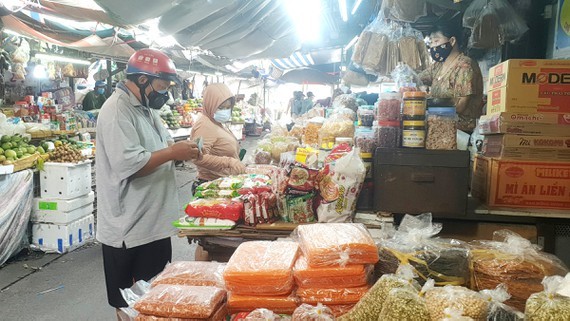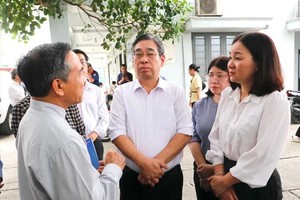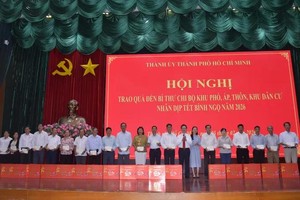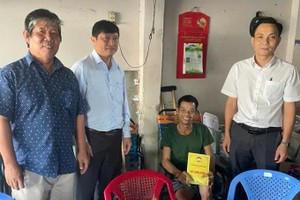 People buy goods at Ba Chieu Market on September 30. (Photo: SGGP)
People buy goods at Ba Chieu Market on September 30. (Photo: SGGP)
Purchasing power weakened
On the morning of September 30, most traditional markets in Ho Chi Minh City were still closed. However, fences and barrier tapes in the areas in front of the gate and around the covered market, such as at Hanh Thong Tay Market in Go Vap District, Nga Ba Bau Market in District 12, Hoang Hoa Tham Market in Tan Binh District, or Hoc Mon Market, were completely removed. Many markets have assigned staff to make a list of small traders wishing to return to trade.
However, at the markets that are allowed to open for trade activities, there are 3-5 market employees keeping watch at the gate to guide people to disinfect and make medical declarations when entering the market. For example, at Ba Chieu Market in Binh Thanh District, before entering the market, people have to queue to keep a safe distance and disinfect. The market arranges a separate entrance and exit. This market has more than 1,300 stalls; however, because of the small number of small traders registered to resume trade activities, the Management Board only arranges a row of stalls on the right, mostly vegetables and dried food stalls and a few stalls selling fresh products.
“The number of people going to the market is not high, mainly people who do the grocery shopping service and those who drop by the market to buy goods when they are on the way to get the vaccination, so I only stock about 50 percent of goods compared to normal days. Suppliers have not been able to travel, and delivery must be carried out by shippers, so the cost prices increase, and the selling prices also surge by about 10 percent," said Trang, a small trader at Ba Chieu Market.
Most small traders said that neither the number of people going to the market nor the number of orders was high. "People may face financial difficulties after social distancing, so they do not buy as many goods as normality, just buying a little bit of each item," said Mong Thuong, a fruit seller at Ba Chieu Market.
Supermarkets have no longer stocked as many goods as before due to the sharp decrease in purchasing power. On the contrary, at convenience stores, such as Co.opfood, Satrafood, Vinmart+, or Bach Hoa Xanh, goods were piled up on the shelves, covering about 90 percent, but there were only a few customers. The convenience store system has been allowed to reopen with the condition that it must ensure pandemic prevention. Therefore, it has contributed to increasing the supply and reducing the pressure on traditional markets when they have not been fully opened. Representatives of supermarket systems, such as Saigon Co.op and Satra, said that the purchasing power had decreased by about 50-70 percent, so supermarkets balanced their stock to avoid the situation of being unsalable or damaged.
Roadmap to gradually open until the end of the year
Representatives of most districts, wholesale markets, and traditional markets in HCMC informed that they already developed plans to reopen markets step by step, following a roadmap and within the pandemic-free areas. The goal was to restore operations by 100 percent by the end of this year. However, they also made it clear that their plans must be updated in parallel with the regulation on how people can travel.
Mr. Huynh Thanh Truong, Head of the Management Board of Ba Chieu Market, said that 150 small traders had registered to trade again by September 30. This number was quite modest, but the Management Board also had to review and determine whether traders were eligible or not. For instance, they have got two doses of Covid-19 vaccines or not. Truong said that according to regulations, stalls must keep a safe distance, and the Management Board is responsible for guiding people and small traders to ensure pandemic prevention at the market. Meanwhile, the management board has 24 people, but only half of them are allowed to work, so it will be difficult to handle when the market operates normally again in the near future.
Deputy Head of the Economic Division of Hoc Mon District Pham Minh Hoang said that he was urgently coordinating with the Management Board of markets in the area to complete the plan to reopen the market following the criteria set by the Department of Industry and Trade and the regulations of the Ministry of Industry and Trade. However, by September 30, the Economic Division had not yet received a list of small traders registering to operate again.
“Currently, small traders and the market management boards are still waiting for the decision of the People's Committee of HCMC on the travel of people to have solutions and specific time to reopen. If markets are open, but only people with satisfactory reasons are allowed to go out, or people are allowed to go to the market once a week, then it will be very difficult for trade activities," said Mr. Pham Minh Hoang.
Previously, the Ministry of Industry and Trade issued Official Letter No.5854 guiding the People's Committees of provinces and municipalities to reopen traditional markets and wholesale markets, which is considered an important move to gradually stabilize social life and reopen the economy because the traditional distribution channel, with the key role of wholesale markets and traditional markets, accounts for nearly 80 percent of the total volume of circulation and consumption of goods in the market.
At the same time, the People's Committee of HCMC also requested districts and Thu Duc City to develop a plan to organize the resumption of operations of traditional markets. Nevertheless, so far, only more than 30 out of 237 markets in the city have reopened with a small number of small traders and a limited volume of goods. Many people said that many places had still hesitated to bring traditional markets into operations again because of strict regulations on market reopening, along with decentralization and delegation of responsibility for localities to ensure pandemic prevention.
On the morning of September 30, most traditional markets in Ho Chi Minh City were still closed. However, fences and barrier tapes in the areas in front of the gate and around the covered market, such as at Hanh Thong Tay Market in Go Vap District, Nga Ba Bau Market in District 12, Hoang Hoa Tham Market in Tan Binh District, or Hoc Mon Market, were completely removed. Many markets have assigned staff to make a list of small traders wishing to return to trade.
However, at the markets that are allowed to open for trade activities, there are 3-5 market employees keeping watch at the gate to guide people to disinfect and make medical declarations when entering the market. For example, at Ba Chieu Market in Binh Thanh District, before entering the market, people have to queue to keep a safe distance and disinfect. The market arranges a separate entrance and exit. This market has more than 1,300 stalls; however, because of the small number of small traders registered to resume trade activities, the Management Board only arranges a row of stalls on the right, mostly vegetables and dried food stalls and a few stalls selling fresh products.
“The number of people going to the market is not high, mainly people who do the grocery shopping service and those who drop by the market to buy goods when they are on the way to get the vaccination, so I only stock about 50 percent of goods compared to normal days. Suppliers have not been able to travel, and delivery must be carried out by shippers, so the cost prices increase, and the selling prices also surge by about 10 percent," said Trang, a small trader at Ba Chieu Market.
Most small traders said that neither the number of people going to the market nor the number of orders was high. "People may face financial difficulties after social distancing, so they do not buy as many goods as normality, just buying a little bit of each item," said Mong Thuong, a fruit seller at Ba Chieu Market.
Supermarkets have no longer stocked as many goods as before due to the sharp decrease in purchasing power. On the contrary, at convenience stores, such as Co.opfood, Satrafood, Vinmart+, or Bach Hoa Xanh, goods were piled up on the shelves, covering about 90 percent, but there were only a few customers. The convenience store system has been allowed to reopen with the condition that it must ensure pandemic prevention. Therefore, it has contributed to increasing the supply and reducing the pressure on traditional markets when they have not been fully opened. Representatives of supermarket systems, such as Saigon Co.op and Satra, said that the purchasing power had decreased by about 50-70 percent, so supermarkets balanced their stock to avoid the situation of being unsalable or damaged.
Roadmap to gradually open until the end of the year
Representatives of most districts, wholesale markets, and traditional markets in HCMC informed that they already developed plans to reopen markets step by step, following a roadmap and within the pandemic-free areas. The goal was to restore operations by 100 percent by the end of this year. However, they also made it clear that their plans must be updated in parallel with the regulation on how people can travel.
Mr. Huynh Thanh Truong, Head of the Management Board of Ba Chieu Market, said that 150 small traders had registered to trade again by September 30. This number was quite modest, but the Management Board also had to review and determine whether traders were eligible or not. For instance, they have got two doses of Covid-19 vaccines or not. Truong said that according to regulations, stalls must keep a safe distance, and the Management Board is responsible for guiding people and small traders to ensure pandemic prevention at the market. Meanwhile, the management board has 24 people, but only half of them are allowed to work, so it will be difficult to handle when the market operates normally again in the near future.
Deputy Head of the Economic Division of Hoc Mon District Pham Minh Hoang said that he was urgently coordinating with the Management Board of markets in the area to complete the plan to reopen the market following the criteria set by the Department of Industry and Trade and the regulations of the Ministry of Industry and Trade. However, by September 30, the Economic Division had not yet received a list of small traders registering to operate again.
“Currently, small traders and the market management boards are still waiting for the decision of the People's Committee of HCMC on the travel of people to have solutions and specific time to reopen. If markets are open, but only people with satisfactory reasons are allowed to go out, or people are allowed to go to the market once a week, then it will be very difficult for trade activities," said Mr. Pham Minh Hoang.
Previously, the Ministry of Industry and Trade issued Official Letter No.5854 guiding the People's Committees of provinces and municipalities to reopen traditional markets and wholesale markets, which is considered an important move to gradually stabilize social life and reopen the economy because the traditional distribution channel, with the key role of wholesale markets and traditional markets, accounts for nearly 80 percent of the total volume of circulation and consumption of goods in the market.
At the same time, the People's Committee of HCMC also requested districts and Thu Duc City to develop a plan to organize the resumption of operations of traditional markets. Nevertheless, so far, only more than 30 out of 237 markets in the city have reopened with a small number of small traders and a limited volume of goods. Many people said that many places had still hesitated to bring traditional markets into operations again because of strict regulations on market reopening, along with decentralization and delegation of responsibility for localities to ensure pandemic prevention.
























